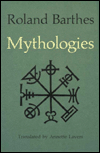The Mythological Language of American Newspapers and Other Mass Media
The list below contains words and phrases so rich in mythological content that they should not appear in print. Yet, as demonstrated below, such myths frequently slip past the copy desks of some of the country's top daily newspapers.
print. Yet, as demonstrated below, such myths frequently slip past the copy desks of some of the country's top daily newspapers.
Any copy editor who purports the slightest degree of literary sophistication should read Mythologies by Roland Barthes, the French literary critic and philosopher, especially the final chapter, titled "Myth Today."
Mythological Words
The word Stressed, when used for attribution, can introduce editorializing into a report. The word is especially inappropriate when used in conjunction with official sources, whose quotation already introduces a heavily biased perspective into the story. Here's an example from a story in The New York Times:
"Wires underneath the cockpit of a Pan Am plane were cut as it sat on the ground at Kennedy International Airport ... Officials stressed that the damage posed no danger to passengers."
Instead of critically investigating whether passengers would have been in danger had the plane taken off without the damage being detected, the article regurgitated the government's official line.
The story appeared on Page B1, the cover of the Metro Section, on Thursday, June 12.
security officials. This euphemism, found on the April 11, 1997, front page of The New York Times, should be recast as secret police when appropriate, as it would have been in the case of the Times's article, which was referring to Vevak, the Iranian secret police.
Other Mythological Gems
"... some cutback on duplicate
staffing" appeared in a story on rising wages and stable prices on the front page of The New York Times, April 11, 1997. Writers should use "layoffs" or "firings" if that's what they mean to say. (Oh, and hey: If you're taking my advice and reading Mythologies, compare the Times's April 11, 1997, Page One story headlined "Wages May Be Heading Up, But Prices Hold Their Own" to the headline and news story deconstructed by Barthes on pages 130 through 133 of Mythologies. Note especially the tone of the Times's story. The story exemplifies Barthes's neologistic governmentality.)
